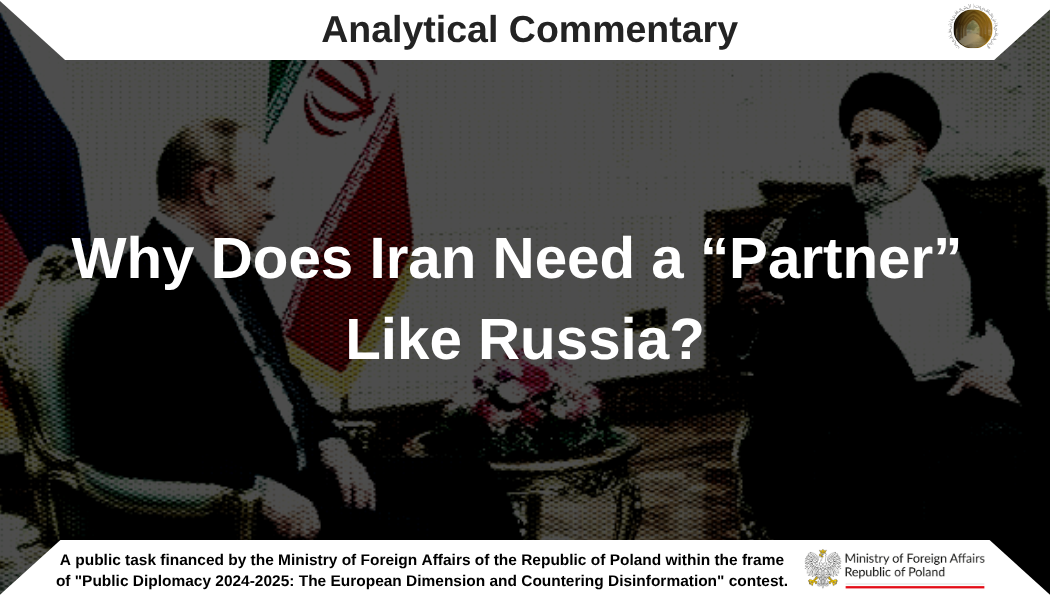
Why Does Iran Need a “Partner” Like Russia?
The Russian ambassador to Iraq, Elbrus Kutrashev, in an interview recently conducted with him by Husham Ali on Al Sharqiyah TV, accidentally revealed what Russia’s “partners” can count on when they need help: nothing. The war between Israel and Iran quickly confirmed these words, although Iran had already received evidence of Russia’s betrayal earlier. It is worth recalling that already in January 2025, the Iranian agency Tabnak revealed that Russia had been “playing in favor of Israel” in Syria, among other things by switching off radars during an Israeli attack on Iranian commanders in that country. As the Iranian agency emphasized, this indicated clear cooperation between Russia and the Israeli project. Russia also sabotaged Iranian aid to Bashar al-Assad during the jihadist offensive, which led to his downfall. The Israeli intelligence network in the Syrian army, loyal to Russia, betrayed the Iranian commander of Aleppo’s defense, Gen. Pourhamshemi, helping in his assassination. If they did it then, can Iran be certain that the Russians did not help Israel target objectives during the twelve-day war? Many indications suggest they did.
Iran should ask itself why Russia – despite having received important support from Iran in the form of Shahed drones – did not reciprocate by delivering the S-400 air defense system and Su-35 aircraft, which would have been very useful during the war with Israel. The answer lies in the aforementioned interview with Kutrashev, in which he states that “Russia does not support attacks on Israel because there are 1 million Israelis of Russian origin there.” It is worth adding that among them are pro-Kremlin oligarchs (e.g., Roman Abramovich), who moved a significant part of their assets to Israel to protect themselves from American sanctions.
But wasn’t the Russian-Iranian Treaty on Comprehensive Strategic Partnership signed in Moscow in January? Kutrashev revealed, however, what a strategic partnership means according to Russia. He emphasized that it is not an alliance, and that Iran cannot count on help in case of an attack – only on the fact that Russia would not support the aggressor. One must admit His Excellency told the truth – and Iran could not count on any assistance from Russia after Israel’s attack. The only question remains: who needs a “strategic partnership” of the kind Russia offers? This also applies to the muqawama in Iraq. If they joined the war, as Kutrashev stated, the only help would consist of “praying for the resistance.”
The Israeli-Iranian war was a gift for Russia, but ultimately Iran’s agreement to de-escalation was a blow for it. Russia had counted on Iran to block the Strait of Hormuz, and on the Iraqi muqawama to strike the American embassy and the Al-Asad base. So what if Iraq would then go up in flames, and Iran would face a long and devastating war? The most important thing was that the United States would be drawn into the war and become bogged down in the Middle East. Such a war would not be beneficial for the US, Iraq, or Iran – but it would be very beneficial for Russia. It would divert American forces and resources from Ukraine and Central and Eastern Europe, enabling Moscow to invade the Baltic states. And the ones paying the price would be the Iranians and Iraqis.
In addition, oil and gas prices would skyrocket. After all, Russia does not use the Strait of Hormuz. Iran, however, would gain nothing from these price increases except destruction. The same applies to Iraq. In whose interest is Russia acting? Perhaps it is time for some people to finally answer that question.
Author: Witlod Repetowicz

